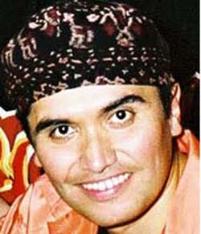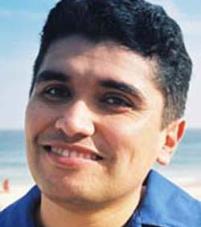Virtual Conservatorium revives musical journey cut short by political turmoil
Published on 19 May, 2004
Carlos Villanueva’s first attempt to complete a full-time university Music/Sound Engineering degree was cut short in the 1980s, when he had to leave Chile in a hurry during the military dictatorship.
Fifteen years later and based in Sydney, the full-time composer and performer had put his academic goals on the backburner due to a lack of flexibility in conservatorium studies.
It was only a few years ago that he became aware of the Virtual Conservatorium initiative of the Central Queensland Conservatorium of Music, based at Central Queensland University in Mackay.
 “The Virtual Conservatorium has opened a window for my career. The academic grounding has enabled me to take on informal studies with a leading Russian composer and has opened up my approach to music making,” Mr Villanueva said.
“The Virtual Conservatorium has opened a window for my career. The academic grounding has enabled me to take on informal studies with a leading Russian composer and has opened up my approach to music making,” Mr Villanueva said.
“I’m more motivated than ever now. When I did not complete my studies at the University of Chile and could not fit in with a standard conservatorium in Australia, I thought I had missed the boat.”.
Mr Villanueva said the Virtual Conservatorium was perfect for working musicians.
He is able to receive video CD lectures, CD Rom readings and paper-based study packages. He has one lesson a week with an established composer in Sydney (Raffaele Marcellino) and submits his composition and orchestration assignments as MIDI sound files or recordings of live performances.
Manager of the Virtual Conservatorium, Ian Bofinger noted that: "the vCon project was created to facilitate the study of music for prospective students who could not attend a typical on-campus style of tertiary music education. These limiting factors are often due to professional or personal commitments such as touring, performances, career or family. Carlos is a perfect example of a Virtual Conservatorium student, studying anywhere, anytime and anyhow while continuing a professional career.".
Mr Villanueva came to Australia as a boy with his family but returned to his homeland as a young man.
He admits being involved with political dissidents and protest songs against the dictatorship when he received a phone call, giving him two weeks to leave the country.
“I’ve since found it may have been a case of mistaken identity, but enough people were being disappeared or jailed and tortured to make me think I took the right decision to leave, since I had Australian residency.”.
Mr Villanueva has completed a diploma in Sound Engineering at the Sydney School of Audio Engineering and has attended evening classes in guitar and musicianship studies at the NSW Conservatorium of Music (now Sydney Conservatorium).
Contacts made during his audio engineering course led to him joining the Latin American group Chichitote which presented school programs for Musica Viva for several years before a tour traffic accident which killed band leader Luis Silva.
 Carlos and his musician wife Wendy survived the accident and have gone on to found the ARIA Nominated band Tigramuna, described on its website (www.tigramuna.com.au) as an ongoing creative musical project inspired by the musical landscape of Latin America (mixing Afro-Cuban, Brazilian, Indigenous South American, European art music and North American jazz).
Carlos and his musician wife Wendy survived the accident and have gone on to found the ARIA Nominated band Tigramuna, described on its website (www.tigramuna.com.au) as an ongoing creative musical project inspired by the musical landscape of Latin America (mixing Afro-Cuban, Brazilian, Indigenous South American, European art music and North American jazz).
Tigramuna’s music has featured in film and documentary soundtracks and in several CD compilations and the band received an ARIA nomination for its debut album.
The band has featured via a four-party ABC television documentary, the comedy TV show Good News Week, major concerts and festivals including the Woodford Folk Festival and the Sydney Festival’s Latino Festival, and via the Musica Viva in Schools program.
Mr Villanueva and Tigramuna gained even more exposure last Saturday (7pm, May 15) in the SBS documentary series ‘Viva’ featuring Australian-based artists returning to their country of birth. The documentary followed his family’s visit to Chile in 2003 to present festivals and carnivals and to interview some of that country’s leading musicians.

